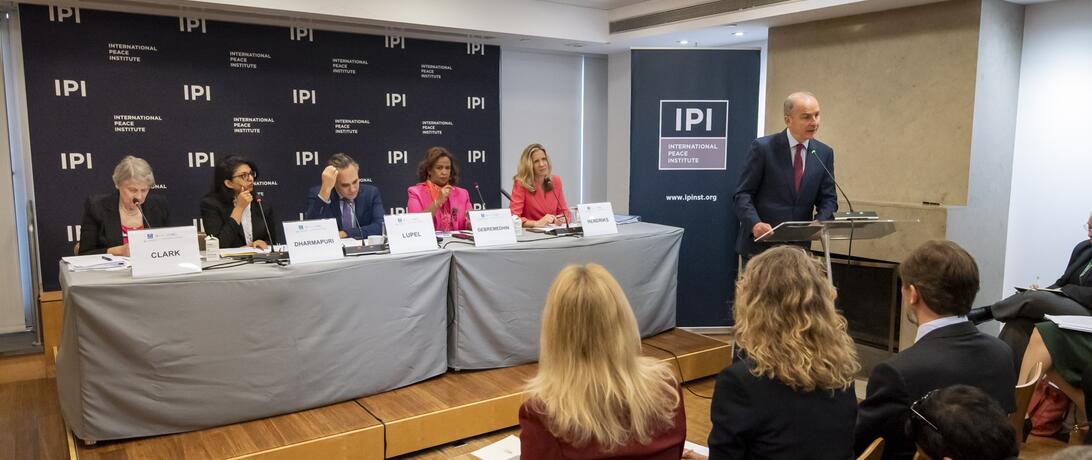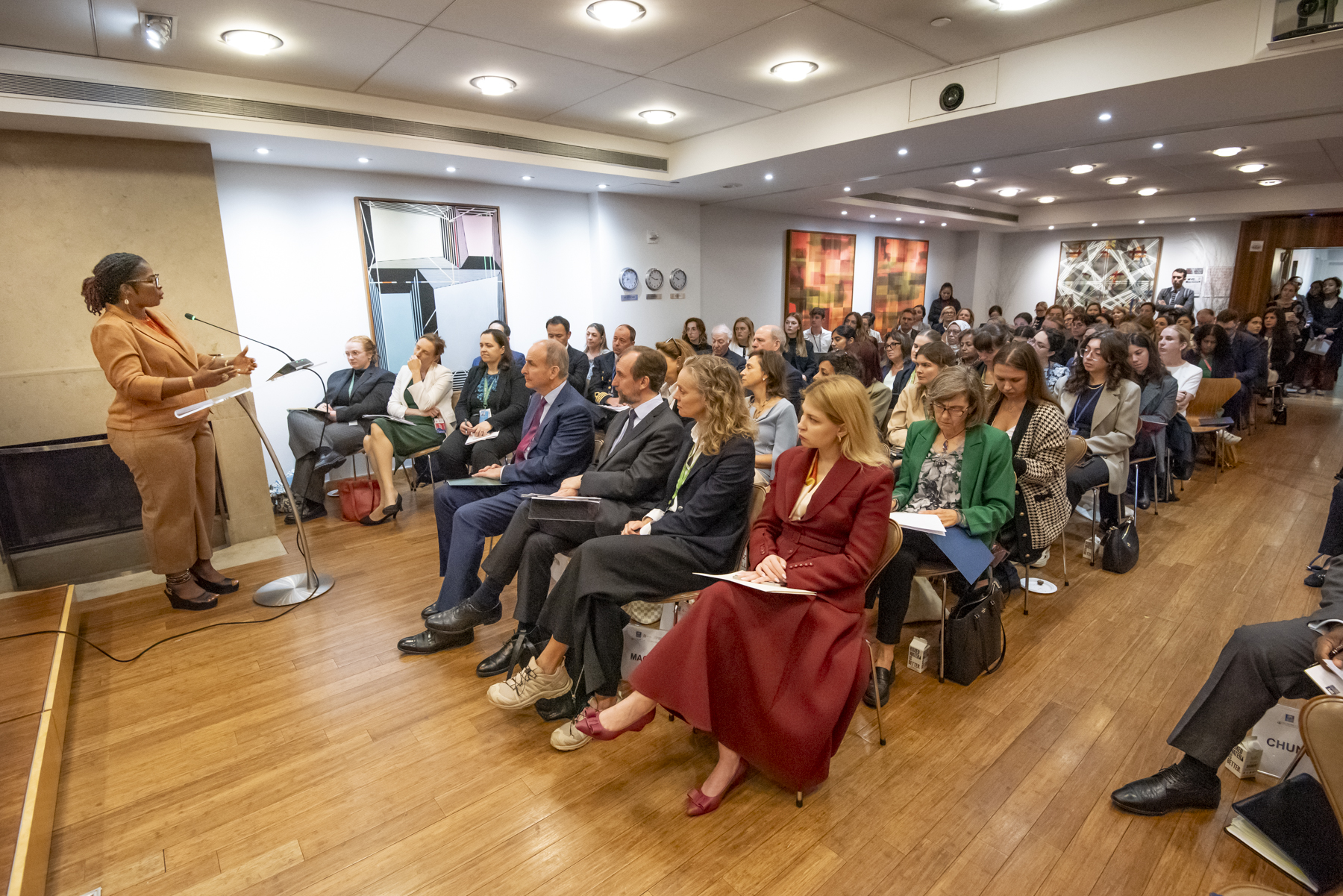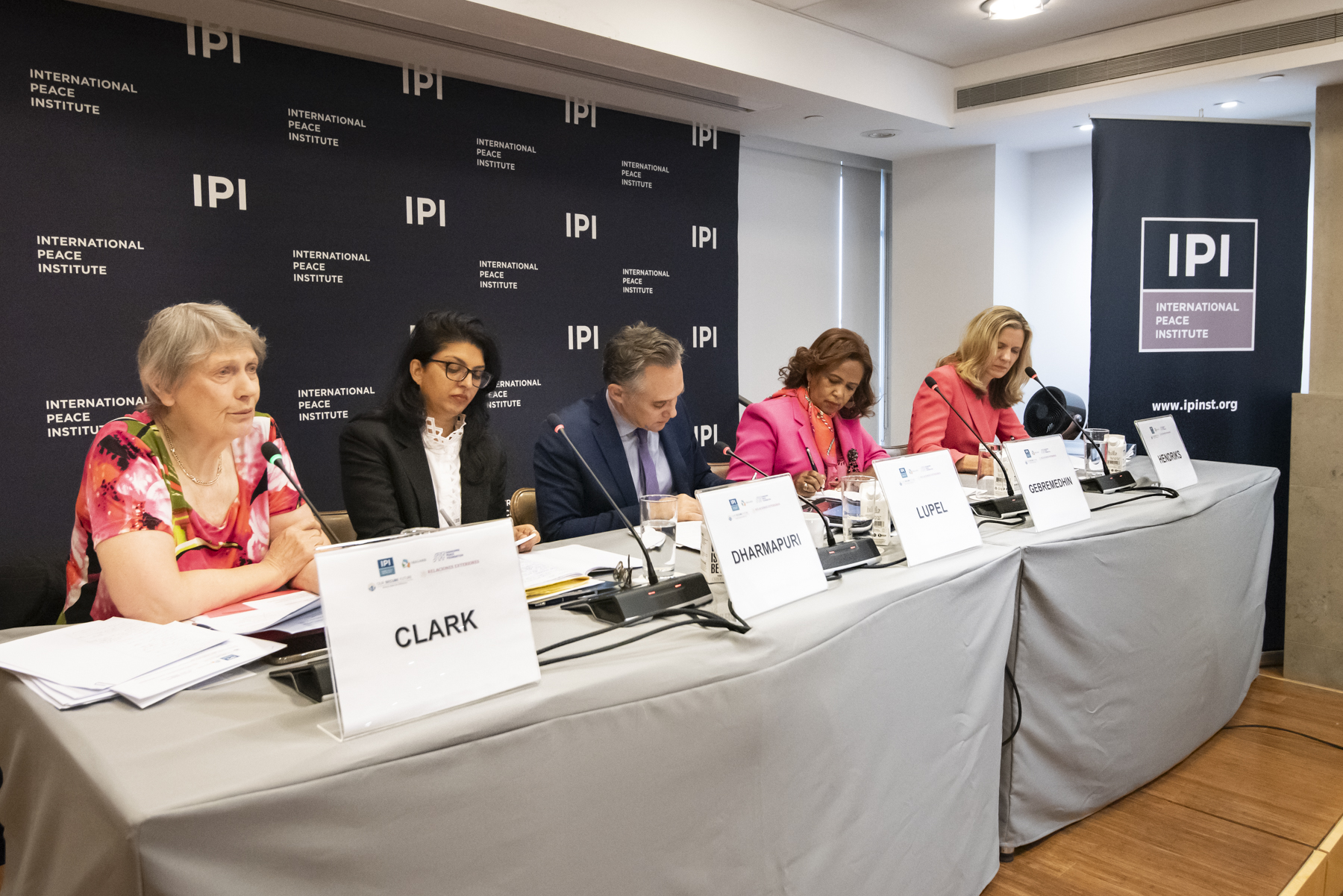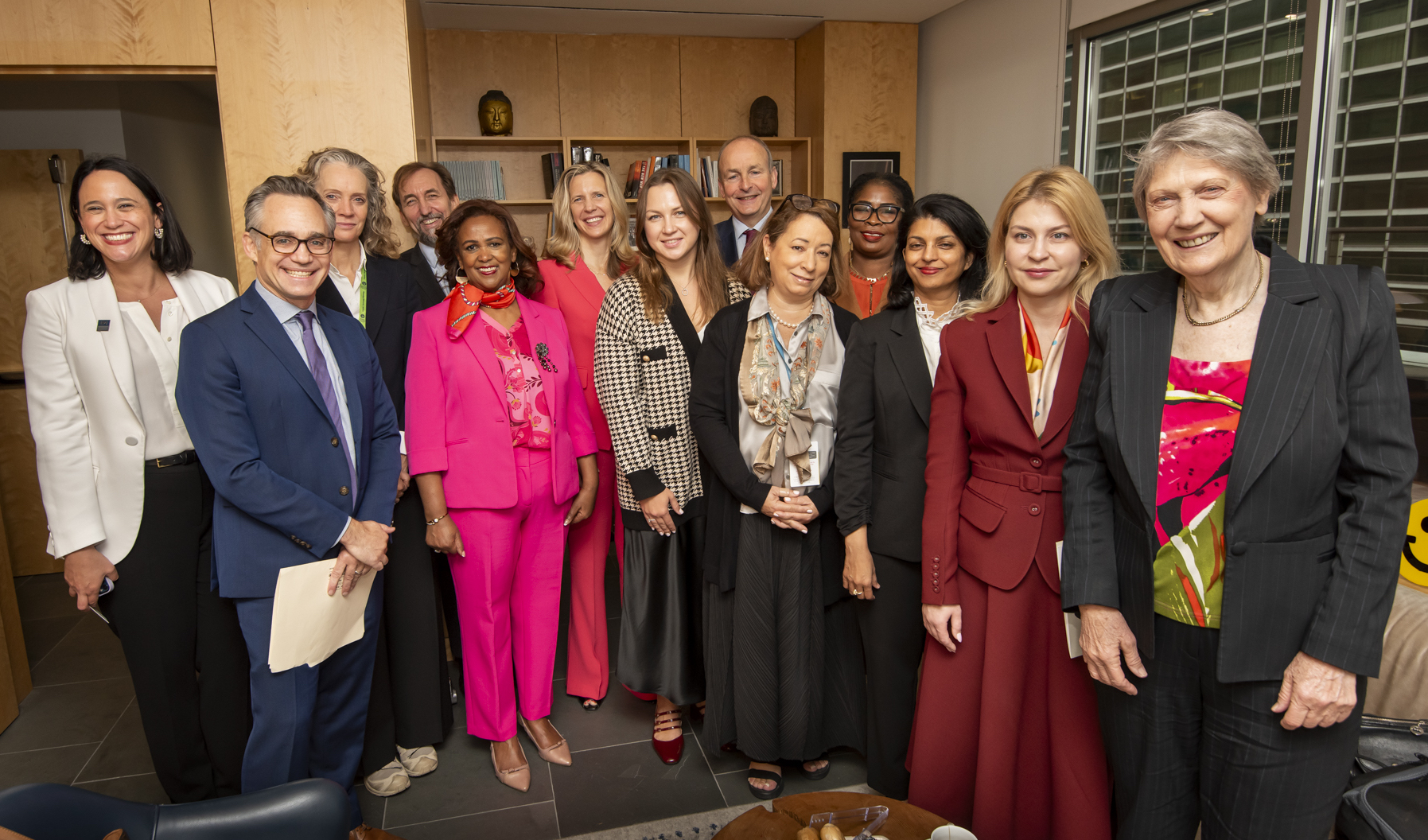
On September 25, 2024, in partnership with Our Secure Future and the Mexican Secretary of Foreign Affairs, the International Peace Institute (IPI), the Permanent Mission of Ireland to the United Nations, and the Sasakawa Peace Foundation co-hosted the annual “Women, Peace, and Leadership Symposium on Connecting the International and the Local: WPS on the Ground.”
In this panel discussion, participants shared their unique experiences and lessons learned about shifting beyond surface-level calls for WPS implementation, to realizing its full potential. Additionally, the discussion offered an opportunity to connect national conversations with global perspectives.
For the event, now in its seventh year, speakers from the United Nations, member states and civil society were invited to share how their work applies the principles of the WPS agenda, as well as discuss key lessons learned related to WPS in preparation for the 25th anniversary of UN Security Council Resolution 1325. The discussion began with opening remarks from Zeid Ra’ad Al Hussein, President and CEO of IPI, who introduced the conversation as an opportunity to “explore how we can ensure the WPS agenda remains central to how the UN and member states apply these lessons both in national contexts.” This is a challenge particularly acute at this year’s UN General Assembly open debate and discussions, where only nine women spoke during the opening debate.
Following Mr. Al Hussein, featured speaker H.E. Micheál Martin, Tánaiste (Deputy Prime Minister), Minister for Foreign Affairs and Minister for Defence of Ireland, shared his concerns about the horrific violence and conflicts around the world, and the deep rooted challenges and impacts on many women and girls. H.E. Martin emphasized Ireland’s continuing work in peacebuilding and the importance of shelters for those women rebuilding their futures, noting that, “We cannot achieve the equal participation of women in decision-making until we address the hardened levels of sexual and gender-based violence suffered by women and girls. There's no hope of gender equality where violence is met with impunity.”
Offering on-the-ground perspectives on the conflict in Ukraine, H.E. Olha Stefanishyna, Deputy Prime Minister for European and Euro-Atlantic Integration of Ukraine and Minister of Justice of Ukraine, shared that despite the full scale war, Ukraine is one of the most advanced countries in the world when it comes to gender mainstreaming. The protection of women's rights has been almost fully legally and practically implemented in the country. “I was one of the first female ministers and now we have almost half of the government formed in a very gender balanced way…we were also one of the first countries to implement the UN Resolution on Women, Peace and Security,” said H.E Stefanishyna. Her remarks also addressed the world's recognition of sexual based violence as an intentional instrument of war and a serious crime.
H.E. Lotte Machon, State Secretary for Development Policy and Deputy-Minister of Denmark, similarly noted that the WPS agenda is a key national priority and offered an update on the development of Denmark’s fifth WPS National Action Plan, which aims to bridge the normative framework to concrete efforts on the ground and scale up support. Her remarks also highlighted the importance of women’s participation for security and peacebuilding efforts, stating, “We need more women participation, otherwise we will simply not have lasting peace and security.” 
H.E. Isata Mahoi, Minister of Gender and Children’s Affairs of the Republic of Sierra Leone, shared the impact of peace and development processes in her own country. “55,000 women suffered during the years of war and today we want to leave that behind us. This is why the government is trying as much as possible to enact the laws that will promote women's empowerment and protect women.” Such laws and policies are gradually becoming a reality in Sierra Leone as an increasing number of women participate in the parliament and cabinet. H.E. Mahoi nevertheless urged continued action: “We are talking a lot, we are speaking a lot, but we need to act…We need to be intentional when we implement the WPS agenda.”
After opening remarks, the panelists addressed topics ranging from grassroots WPS efforts in Ethiopia to the implementation of WPS National Action Plans.
H.E. The Rt Hon. Helen Clark, Member of The Elders, Former Prime Minister of New Zealand, Former Head of the UN Development Programme, and Co-Chair of the WHO Independent Panel for Pandemic Preparedness and Response, highlighted the progress of the women of Sierra Leone and their contributions to achieving peace and security and advancing women’s rights and equal participation. She lauded the strength of the WPS framework but stressed the need for stronger implementation in the field. She also raised concerns about UN interactions with the Taliban, which have failed to include women as preconditions. “The Elders call for the meaningful participation and inclusion of women in peacemaking and peacebuilding processes to be regarded as mandatory… international actors must insist on a meaningful role for women as a prerequisite for support, not a nice to have.”
Saba Gebremedhin, Director of the Network of Ethiopian Women’s Associations, spoke about women’s efforts to promote peace and security in Ethiopia, including consultations across the country to implement Ethiopia’s WPS National Action Plan, as well as training for more than 100 women on peacebuilding, mediation, and WPS. Ms. Gebremedhin shared updates on initiatives to gather women and have discussions about their peace and security perspectives and concerns. “We started to build WPS agendas... to do coffee meetups and discuss security and peacebuilding matters. Women are sitting together to talk about what the conflict is... then we document these insights and share them with government officials.”
 Sahana Dharmapuri, Vice President of Our Secure Future (OSF) and PAX sapiens Foundation, focused on OSF’s National Action Plan Academy and the lack of general funding for WPS implementation. “We all agree on the objectives… But we also heard questions of ‘how do we do it?’ ‘How do we achieve this?’ We started the NAP Academy to close these gaps and to increase peace and security for all…Through women and women in leadership roles." In regard to the implementation and funding gaps, she identified the lack of political will and institutional capacity to fully implement the WPS agenda. While there is some money dedicated to WPS initiatives, it is not enough; nor is there transparency around its allocation. “We need the political will to take action on this.”
Sahana Dharmapuri, Vice President of Our Secure Future (OSF) and PAX sapiens Foundation, focused on OSF’s National Action Plan Academy and the lack of general funding for WPS implementation. “We all agree on the objectives… But we also heard questions of ‘how do we do it?’ ‘How do we achieve this?’ We started the NAP Academy to close these gaps and to increase peace and security for all…Through women and women in leadership roles." In regard to the implementation and funding gaps, she identified the lack of political will and institutional capacity to fully implement the WPS agenda. While there is some money dedicated to WPS initiatives, it is not enough; nor is there transparency around its allocation. “We need the political will to take action on this.”
Sarah Hendriks, Director of Policy, Programme, and Intergovernmental Support Division (PPID) at UN Women, pointed to the inconsistencies within UNSCR 1325, which remains largely unrealized as men still dominate both the halls of power and councils of war. Ms. Hendriks noted the remarkable efforts made by women peacebuilders, stating, “There is certainly no shortage of examples of women building peace at the local level, but it is their exclusion from decision-making that robs us of that pathway to a world of peace.”
Martin Chungong, Secretary General of the Inter-Parliamentary Union, highlighted the importance of having men participate in the WPS agenda and discussion, emphasizing the “need to recruit more male champions to the cause of Women, Peace and Security.” Mr. Chungong's remarks also noted the importance of policies and legal frameworks for implementation, highlighting the need for parliaments to make laws that ensure women's representation. “Parliaments need to exercise their oversight and make sure that what is being articulated at the international level is implemented on the national level.”
H.E. Arlene Tickner, Ambassador-at-Large for Gender Issues and Global Feminist Politics of Colombia, echoed the importance of women and girls participation in Colombia and across the world. She advocated for more safeguarding and strengthening of laws, explaining that making these rules more robust is fundamental to building lasting peace.
Hirotaka Matsuo, Deputy Director General of Foreign Policy Bureau for the Ministry of Foreign Affairs of Japan, discussed Japan's efforts to implement the WPS agenda and noted Japan will mark the 25th anniversary of the implementation of UNSCR 1325 by hosting a major event to demonstrate strong leadership in the WPS network and to accelerate the formulation of National Action Plans especially in Asian countries.
Kaavya Asoka, Executive Director of the NGO Working Group on Women Peace and Security, noted the importance of involving additional marginalized groups such as LGBQT+, and ended with concrete recommendations, such as ending violence, defending human rights, including reproductive rights, ensuring the full participation of women in decision-making, and supporting civil society and feminist groups.
Belen Martinez Carbonell, Managing Director for Global Affairs at the European Union, highlighted the EU’s efforts to promote the WPS agenda as the EU remains the leading donor for financing projects in support of WPS.
Closing remarks were provided by H.E. Alicia Buenrostro Massieu, Deputy Permanent Representative of Mexico to the United Nations. H.E. Buenrostro highlighted the importance of connecting local and international efforts and noted the existing gaps in theWPS agenda in Latin America. “Peace does not just mean the absence of conflict, we believe that peace also means searching for wellbeing by strengthening community ties and social justice.”
Watch a recording of the event here.

Photos: International Peace Institute